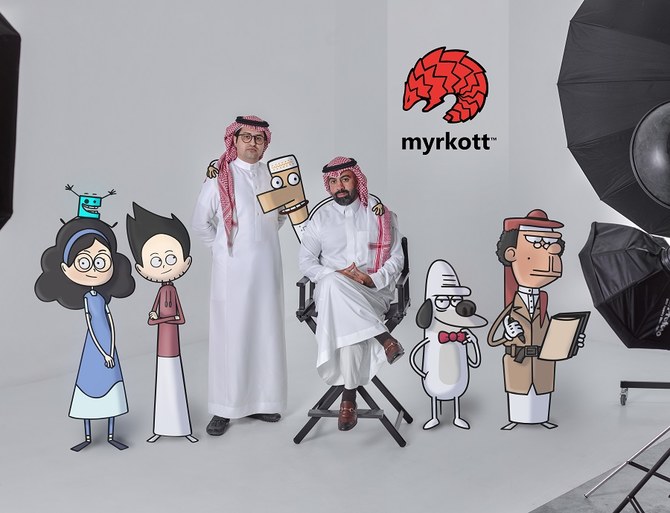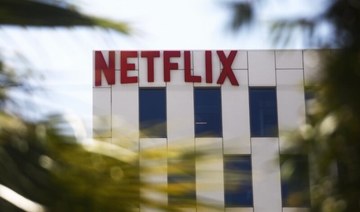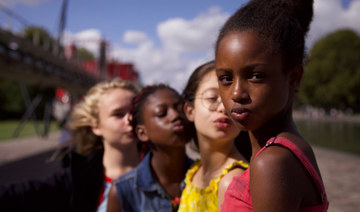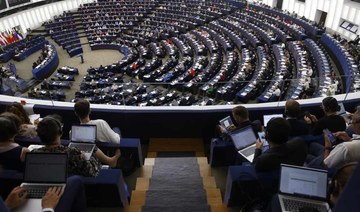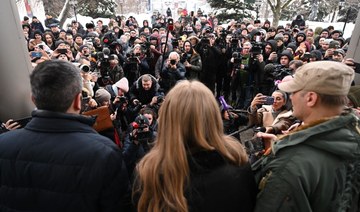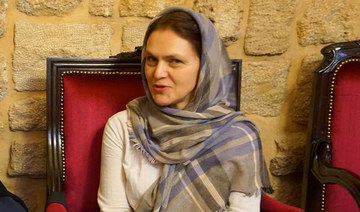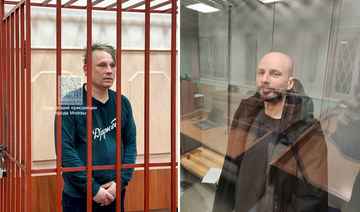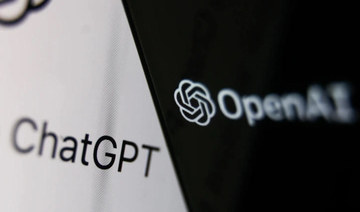RIYADH: Netflix has struck a five-year exclusive partnership with Saudi Arabian animation studio Myrkott to produce Saudi-focused shows and films along with a similar period first-look option on the company’s upcoming projects.
The link-up will entail production of new and exclusive seasons of the “Masameer” cartoon series and related upcoming movies, a new licensed original adult animation series, a licensed original feature film, in addition to a library compilation of all previous seasons of “Masameer” with special edits exclusive to Netflix.
The announcement is the latest in Netflix’s investment in the Middle East and North Africa (MENA) region. The video streaming company is also working with Saudi talent such as film directors Hana Al-Omair and Haifaa Al-Mansoor, while introducing new Arabic Originals including “Paranormal,” “Abla Fahita,” “Al-Rawabi School for Girls,” and two as-yet-untitled projects with Tunisian actress Hend Sabry and Egyptian singer Amr Diab.
In the last year, the amount of programming not from their home country or the US watched by Netflix members increased by 10 percent and non-English-language viewing on Netflix has increased 23 percent year-on-year – a clear testament to the opportunity and potential the region, and Arabic-language content, presents.
Arab News spoke to Nuha Eltayeb, director of content acquisitions for the MENA region and Turkey at Netflix, to find out more about the new partnership and Netflix’s content strategy and investment in the region.
Tell us about Netflix’s experience in the MENA region and what trends you have noticed?
For Netflix, great entertainment is not just about exporting US content internationally. It is about sharing stories from the world with the world.
Stories are universal. The emotions of laughter, joy, grief, pain – we all feel them irrespective of where we live which is why an authentically told story will resonate with viewers around the world.
In the Arab world, we’re working with established creators as well as new voices to bring their unique perspectives to life through powerful stories that reflect their culture and experiences – in their own authentic voice.
We genuinely believe that great stories can come from anywhere and that they have the power to travel far and wide.
For example, “La Casa de Papel” (“Money Heist”) proved to be hugely popular in Saudi Arabia, because as a story it has the power to appeal to an audience far beyond its language or country of origin.
The ambition with Arabic content is similar – we’ve invested in building a catalogue of iconic films and giving them a home on Netflix. For example, our “Arabic Nostalgia” collection lives on its own so people can search for it, access it, and experience it in its entirety.
What about Netflix’s previous investments in the MENA region?
The regional entertainment industry is evolving rapidly and witnessing a fresh wave of creative growth – a journey we are excited to be part of.
We are focusing our efforts on consciously diversifying our catalogue to ensure that the Arab world is well-represented and has a wide variety of content that resonates with different tastes.
Our library of licensed Arabic productions continues to expand. In June this year, we announced a catalogue of 44 films blending iconic, Arabic contemporary content from some of the region’s boldest and most innovative filmmakers.
Powerful stories such as “Destiny” by Youssef Chahine, “The Message” by Moustapha Akkad, and “Capernaum” by Nadine Labaki were made available globally – reflecting the beauty, complexity, and diversity of Arab culture to a global audience.
The list was curated thoughtfully – showcasing the heritage of early Arab films along with the critically-acclaimed work of contemporary directors who have earned praise for telling bold and inspiring stories, wrought with emotion, pride, and passion. The catalogue includes titles from Sudan, Lebanon, Egypt, Tunisia, Kuwait, Syria, Algeria, and the UAE.
Earlier in the year, we also launched a collection of Arabic plays, taking our members on a trip down memory lane.
The restored plays, available via “Arabic Nostalgia” include popular works such as “El Eyal Kebret,” “Al-Motazawegoon,” “Bye Bye London,” “Raya wa Sekina,” “Morahek Fl Khamseen,” “Shahed Ma Shafsh Haga,” “Sok Ala Banatak,” “Madraset Al-Moshagbeen,” and “El-Wad Sayed El-Shahat.”
These plays represent the golden age of Arabic cinema, and we could not be happier that we were able to give them a home on Netflix.
Most recently, in partnership with EP Saudi, we also launched our first-ever Saudi series, “Whispers,” written by Roolan Hassan and directed by Hana Al-Omair. It is one of many Khaleeji and Saudi titles available on the service, offering a different take on traditional dramatic shows in the region that appeal to global audiences.
Additional Saudi titles available on Netflix include “Takki,” “Zero Distance,” “Menahi,” and “Wadjda.”
Can you give us more details about the partnership with Myrkott?
We announced a five-year-long exclusive partnership with Myrkott, marking our latest investment in Arabic content.
The partnership brings Saudi talent to the forefront of creative storytelling and showcases Myrkott’s present and future titles to Netflix members around the world.
It entails production of Saudi-focused shows and films and a five-year first look option on Myrkott’s upcoming projects, which include new and exclusive seasons of the “Masameer” series, “Masameer” upcoming movies, a new licensed original adult animation series, and a licensed original feature film, in addition to a library compilation of all previous seasons of the “Masameer” series with special edits exclusive for Netflix.
Myrkott is at the forefront of creative storytelling and animation in the region, and we’re continually investing in young Saudi creatives to share their stories across the Arab world and globally.
How much are you investing in the region and in what form i.e. Originals, dubbing etc.?
We have embraced the Arab world’s uniqueness and developed a regional investment strategy that caters to the nuances of audiences in the region.
We’re rapidly expanding our library of Arabic content, investing in more original Arabic productions, localizing content via subbing and dubbing efforts, partnering with businesses, and hiring people from the region dedicated to spearheading our growth in the Arab world.
We are also investing heavily in localization, a complex and continuous effort that allows us to transport stories to a global audience, while still preserving their authenticity and creativity.
Some of our licensed titles were subbed in English allowing for a larger global audience to watch great stories from the Arab world, such as “This Evening,” “Tango,” “Hidden Worlds,” “The Writer,” and “I Have A Script.”
As for dubbing, we are currently testing the Egyptian dialect with family friendly shows such as “The Willoughbys,” and “Over The Moon,” allowing members to choose between modern standard Arabic and the Egyptian dialect.
Most recently, we have also invested in making Netflix and entertainment in general, more accessible and inclusive.
Our closed captions feature, which we create for all Originals, gives more detail on the sounds occurring within TV shows or movies in addition to the dialogues, which helps members with hearing impairments.
Our audio description feature, which is an optional narration, allows visually impaired customers to hear what scenes look like and what is happening on-screen, including physical actions, facial expressions, costumes, settings, and scene changes.
What prompted the increased investment in the region?
We want to give our members access to great stories that can travel far and wide – connecting them with experiences far beyond their place or language of origin.
We want to empower Arab storytellers with the tools they need to tell the best version of their stories, and then help connect these stories with a global audience so we’re able to export cultures that were previously underserved and underrepresented.
We know that giving Arabs the opportunity to see themselves on screen instills pride, and we want to be a meaningful part of the creative communities in the region – not only by creating content that is made by Arabs for Arabs, but by exposing Arabic shows and films to the world and providing local talent and filmmakers with a platform to gain fans globally.
Where does the MENA region sit within Netflix’s global content acquisition and growth strategy?
The Middle East and North Africa is an important market for Netflix’s growth globally. We support the film and TV industry in the MENA region in several ways, including commissioning originals, acquiring and licensing titles, and local production.
The Arab world’s history, diversity, experiences, culture, humor, and love for entertainment excites us – we’re obsessed with finding good stories, talented creators, and amazing talent to bring their unique perspectives to life.
What do you foresee for the future of content streaming?
We are obsessed about improving the consumer experience: Whether it’s no ads, complete control over how and when you watch, better discovery, higher-quality sound and audio, or pioneering new formats such as interactive TV.
Today, we’re just scratching the surface of what’s possible. We are constantly innovating – keeping privacy, control, and choice at the center of the Netflix experience.



